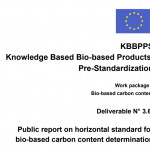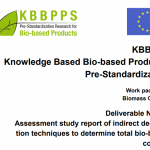S2Biom review paper: Sustainable supply of non-food biomass for a resource efficient bioeconomy.
The S2Biom project supported the sustainable delivery of non-food biomass feedstock at local, regional and pan European level through developing harmonised data sets, strategies, and roadmaps at local, regional, national and pan European level for EU28, Western Balkans, Ukraine, Moldova and Turkey. The project improved scientific evidence on the availability, cost supply, technologies and framework conditions (policy, financing, sustainability) for lignocellulosic non-food biomass by 2030.
The aim of this S2Biom paper is to give a state-of-the-art overview about various studies which investigated the present and potential sustainable supply of non-food biomass in the EU. The aim of this S2Biom paper is to give a state-of-the-art overview about various studies which investigated the present and potential sustainable supply of non-food biomass in the EU.


